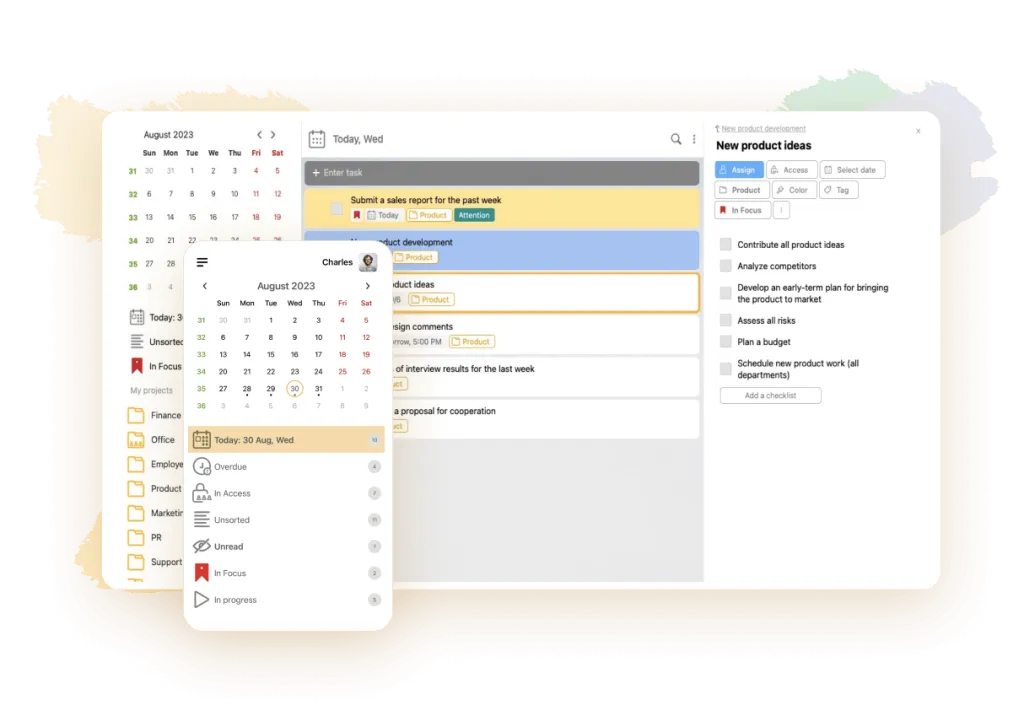
Max Miller
March 19, 2024
The rapid pace of life and limited timeframes for activities often put even the most responsible managers in a deadlock. Therefore, an important skill for any manager is the ability to plan the working day and prioritize tasks correctly.
But how can this be achieved in modern conditions? Let us consider this question in more detail below in the article.
Why schedule the work
A manager is a key figure in the work of any company, the success, sales and profits of the business directly depend on the effectiveness of his activity. Most managers in enterprises perform a huge number of different functions.
They manage the activities of the organization, coordinate the activities of subdivisions, departments and services, work with human resource units, determine the goals and objectives of the activities of other employees. In addition, they are responsible for decision-making, control the fulfillment of projects of executors, represent the company at meetings with customers and partners.
Such multitasking requires high professional and personal qualities from a manager. He should not only have theoretical knowledge of his specialty, but also be able to react quickly to changes, be stress-resistant and effectively plan his working day literally in a couple of minutes or steps.
However, recently more and more managers are characterized by a complete inability to manage their time. This is due to the huge number of things managers have to do (operational meetings, planning meetings, appointments, business calls), as well as many distractions.
This raises issues for the manager such as:
-
weak elaboration of key areas of activity;
-
haphazard use of documentation, correspondence;
-
confusion, constant rushing, nervousness;
-
insufficient level of managerial labor, low degree of delegation, lack of responsibility of subordinates;
-
no order in the workplace, no clarity in business, no organization;
-
The need to stay late at work or finish work at home.
It is important to remember that time is the only resource that cannot be renewed. Therefore, time management and the ability to build a proper daily schedule are the most important target skills that allow a manager to use the day in a calculated and rational way, to achieve success in the company’s development, to minimize costs and to be self-confident.
And an increasing number of managers are thinking about how to level the effect of time leakage from under their fingers and manage working hours as productively as possible, in order to have time to do the maximum number of tasks, get the appropriate income and move further up the career ladder.

Principles of manager’s work planning
In order to properly allocate time during the workday, each employee must adhere to certain principles of self-management. Let’s consider examples of the main ones:
-
Plan ahead (for the day, week, month). Make clear short- and long-term plans, label them on paper or electronically. Break down large tasks into subtasks. Allow time for force majeure.
-
Formulate specific goals, moving from the general to the particular. Develop a system of values, taking into account possible mistakes. Think about consequences, motivation of personnel.
-
Fix or visualize plans in special programs. Always make backups, store data in cloud storage.
-
Prioritize. Rank things in order of importance, do the important and urgent things first, only then move on to the minor ones. Plan and execute difficult, unpleasant tasks during hours of personal peak productivity.
-
Focus on what’s important. Concentrate on large-scale goals, do not get distracted by extraneous things, know how to say “no”, avoid unscheduled breaks, idle chatter, watching social networks, TV during working hours.
-
Analyze the experience. Remain aware, observe changes, review past mistakes. Draw conclusions from the analysis. Find a way out of difficult situations and take measures in advance to prevent them from happening again.
-
Plan for rest. Improve personal performance by restoring resources during socializing with loved ones, meals, and sleep.
The ability to follow all of the above principles and features distinguishes an effective manager from an unproductive one who wastes time for nothing. However, in order to build such a systematic approach, it is necessary to make considerable efforts, develop self-organization skills, and constantly be in the tone, which not every manager can do.

Planning methods
Let’s look at a few popular time-management techniques that allow managers from any area of business to effectively manage working time, become more productive and increase firm values, labor rates.
1. SMART approach
A unique method for describing and setting specific goals according to clear principles. It was first described by George Doran in 1981. It is very popular among people interested in personal and professional productivity. It gets its name due to the basic principles underlying the technology
-
S (Specific) - Specificity: the objectives should be stated unambiguously, with no liberties taken;
-
M (Measurable) - measurability: to understand how and with what criteria the process of achieving a goal can be measured;
-
A (Achievable) - achievable: set realistic targets, without exaggerated expectations;
-
R (Relevanr) - Relevance: choose relevant and timely goals that the company needs at the moment;
-
T (Time bond) - Time constraint: specify a clear deadline.
Who is suitable for: managers working in project management, management, advertising, production. But will not be very useful to people with a creative mind, as well as creative positions, professions.
2. Pareto Principle
A theory put forward in the early 20th century by economist and sociologist Vilfredo Pareto. It is a reflection of the dependence of results on the effort put into them. Pareto’s rule states that only 20% of efforts give 80% of the result, while the other 80% of efforts bring only 20% of the final result.
According to this proportion, the technique suggests that time should be allocated first and foremost to the priority activities that produce a higher percentage of results but take the least amount of time. The theory helps to identify the right goals and prioritize them correctly.
Who’s Suitable: managers in any field of business for professional and personal achievement.
3. Parkinson’s Law
There are several laws in total, formulated by historian Cyril Northcote Parkinson. But the most famous of them is the first one, which states that “Work takes the time given to it”. The principle states that the performance of any activity takes exactly as much time as is spent on it.
As such, employees are encouraged to track the amount of time spent on a particular task over several days and then use the data to effectively plan their workday.
Who is suitable for: managers of any field of business.
4. Eisenhower Matrix
A special system created by the methodology of the 34th President of the United States, Dwight Eisenhower, and later popularized by the American writer Stephen Covey. It consists in categorizing all cases into four groups:
-
Important and urgent.
-
Important and non-urgent.
-
The unimportant and the urgent.
-
The unimportant and the non-urgent.
Tasks from the first group are suggested to be performed first, while tasks from group 3 should be delegated and those from group 4 should be canceled or replaced.
Who is suitable for: managers who find it difficult to plan their working hours.
5. ABVHD method
A popular modern method proposed by business coach Brian Tracy. It consists of simply ranking things according to their importance and quickly achieving results. It suggests making a list of tasks and then categorizing them by importance in alphabetical order. A letter A is assigned to the main goal, B to the less important goal, and so on.
Who is suitable for whom: managers of any sphere of business, who have to solve a huge number of tasks on a daily basis.
Mistakes in planning
Time management does not forgive managers for even small mistakes made even for good reasons. Therefore, it is better to know the enemy in advance in order to understand where and in what place a manager can make a mistake or misstep. The main mistakes in planning and conducting a working day are:
-
the inability to say no, to say no;
-
the desire to be good, helpful, and try to do everyone a favor;
-
slowness and absent-mindedness in general;
-
inability or unwillingness to listen to the interlocutor;
-
excessive sociability;
-
Inability to estimate the amount of work to be done, to set a deadline date;
-
a complete avoidance of setting any deadlines;
-
the habit of procrastination or grabbing everything at once;
-
Lack of habit of taking notes, fixing plans and tasks.
You need to make as few of these mistakes as possible to be effective at work, get your daily chores done, and have a productive day.
Also the main enemies of managers are called two character traits that prevent them from performing tasks in a timely manner and organizing the day correctly. They include procrastination (constant desire to put things off for later, to choose in favor of unnecessary and unimportant tasks) and perfectionism (eternal dissatisfaction with the result, the desire to redo, to bring things to an unattainable ideal).
Scheduling app
In addition to the best time-management techniques, special online services for time and work planning are often of undoubted benefit to the employees of an enterprise. They are called task trackers and are successfully used in both large and small companies.
We have compiled a small overview of the most popular, simple and convenient applications that managers can use both individually and with colleagues.
1. LeaderTask

A convenient and modern tool for personal and professional time management at any stage of company development. Suitable for scheduling tasks, meetings, project and employee management. Easy introduction to work.
Key Functionality:
-
tasks, subtasks, checklists, schedules, instructions;
-
delegating projects, assignments;
-
Visualization with kanban boards, tags, colors;
-
a day planner, a schedule and a calendar;
-
team productivity statistics;
-
possibility to attach attachments of any format;
-
smart notifications, reminders, recurring tasks;
-
sorting and filtering information;
-
Intelligent search, history by task;
-
synchronization with different devices;
-
the possibility of working in offline mode.







